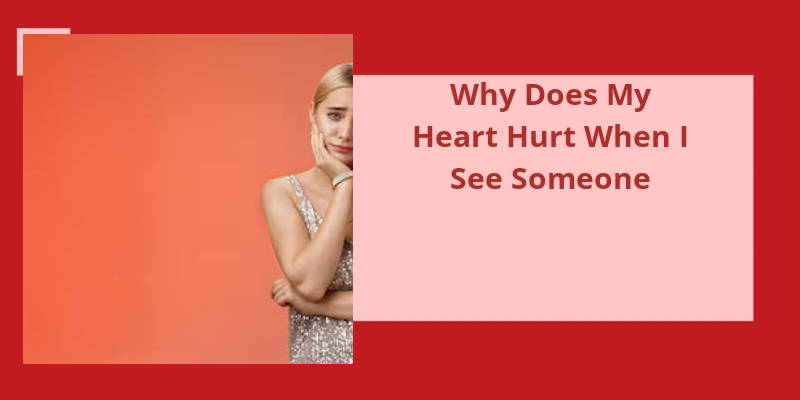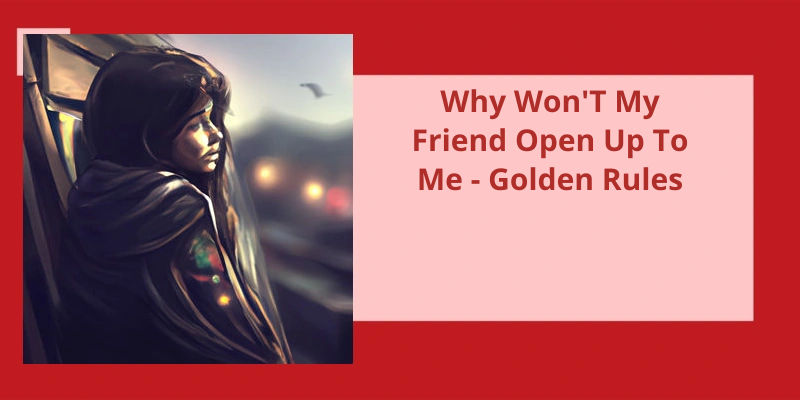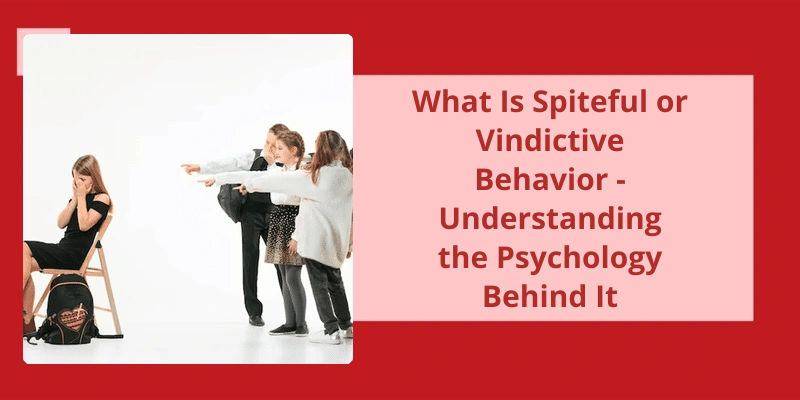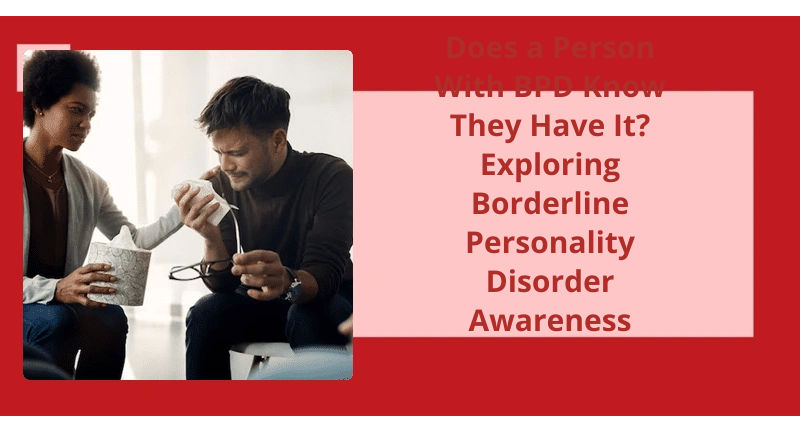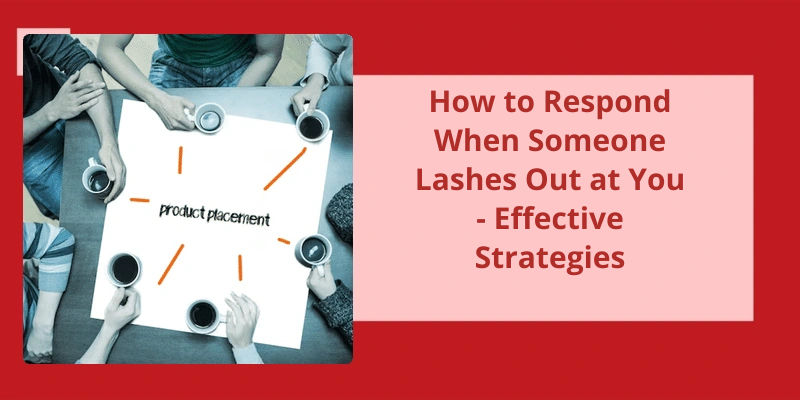Have you ever experienced a sudden pain in your chest when you catch a glimpse of someone who holds a special place in your heart? It's a common phenomenon that leaves many people puzzled and searching for answers. While emotions like love, longing, and admiration can be a source of happiness, they can also trigger physical sensations that make our hearts ache. But why does this happen? The answer lies in the intricate connection between our brain and body. During moments of intense emotional distress, the anterior cingulate cortex, a region of the brain, can respond by ramping up the activity of the vagus nerve, which extends from the brain stem to the neck, chest, and abdomen. However, when this nerve is overstimulated, it can manifest as physical discomfort, leading to a sensation of heartache. So, the next time your heart hurts when you see that special someone, remember that it's not just an emotional reaction—it's a fascinating interplay between your mind and body.
Why Does My Chest Hurt When I See My Crush?
Have you ever experienced a sudden sharp pain in your chest when you see someone you’ve strong feelings for? The sensation can sometimes be overwhelming, leaving you wondering if there’s something physically wrong with your heart. Surprisingly, the answer may lie in the realm of emotions rather than physiology.
When you feel an intense rush of emotions towards someone, it can trigger a physiological response in your body. This response includes an increase in stress hormones, such as adrenaline, which can lead to a temporary spike in blood pressure. As a result, you may experience chest pains as your heart tries to cope with the excess pressure.
It’s important to remember that these chest pains are often transient and not a cause for alarm. However, if you frequently experience such symptoms or if they worsen over time, it’s crucial to seek medical advice to rule out any underlying health issues.
The connection between emotions and physical sensations isn’t entirely surprising. Love, especially when it’s passionate and intense, can have a profound impact on our well-being. It isn’t uncommon for people to encounter a range of physical sensations when in the presence of their crush, including a racing heart, sweaty palms, or even a knot in the stomach.
One of the powerful and bittersweet aspects of love is it’s ability to evoke physical sensations that can resemble those of a heart attack. When overwhelmed with strong emotions, individuals may experience symptoms such as chest pain, irregular heartbeat, and shortness of breath. This phenomenon, known as “broken heart syndrome,” highlights the intricate connection between our emotional well-being and physical health.
Does Your Chest Hurt When You’re in Love?
Does your chest hurt when youre in love? Love can be a profound and intense emotion that affects us physically as well as emotionally. In rare cases, love can even cause physical symptoms that mimic those of a heart attack. This condition is known as “broken heart syndrome” or stress-induced cardiomyopathy.
When someone experiences intense emotions, such as love or grief, their body can release a surge of stress hormones like adrenaline. These hormones can have a profound effect on the cardiovascular system, causing symptoms such as shortness of breath, irregular heartbeat, and chest pain. The chest pain associated with broken heart syndrome is often described as a squeezing, pressure-like sensation, similar to that of a heart attack.
It’s important to note that while the symptoms of broken heart syndrome can be alarming, the condition itself is usually temporary and reversible. Unlike a heart attack, broken heart syndrome doesn’t cause permanent damage to the heart muscle. In most cases, the symptoms resolve within days or weeks with the appropriate medical care and emotional support.
The exact cause of broken heart syndrome isn’t fully understood, but it’s believed to be a combination of psychological and physiological factors. The intense emotional stress associated with love or loss can trigger a surge of stress hormones, which can temporarily weaken the heart muscle. Additionally, researchers have found that some individuals may be more susceptible to broken heart syndrome due to certain genetic or hormonal factors.
If you experience symptoms that resemble a heart attack, it’s essential to seek medical attention immediately. A healthcare professional can evaluate your symptoms, perform diagnostic tests, and provide appropriate treatment and support.
If you experience these symptoms, it’s essential to seek medical attention to ensure proper evaluation, diagnosis, and treatment. Remember, while love may sometimes hurt, taking care of your heart should always be a priority.
The Emotional and Psychological Effects of Love: Explore the Various Ways That Love Impacts Our Emotions and Mental Well-Being.
Love is a powerful emotion that can have a profound impact on our hearts and minds. When we see someone we love, our heart may hurt, but it isn’t a physical pain. Instead, it’s a strong emotional reaction to the presence of someone we care deeply about. This feeling is often a result of the release of stress hormones, such as adrenaline and cortisol, which can cause a racing heart and a sense of unease.
Furthermore, love can also trigger a range of positive emotions, such as joy, happiness, and contentment. When we see someone we love, our brain releases chemicals like dopamine and oxytocin, which are associated with pleasure and bonding. These chemicals can create a sense of euphoria and contribute to the overall well-being of our mental state.
On the other hand, the emotional impact of love can also bring about feelings of anxiety, jealousy, and sadness. When we care deeply for someone, we may fear the loss of their love or worry about their well-being. These emotional responses can lead to aching hearts and a deep sense of longing.
In addition to the emotional effects, love can also have a significant impact on our psychological well-being. Being in a loving and supportive relationship can boost our self-esteem, foster feelings of belonging, and provide a sense of purpose. Love can also enhance our ability to cope with stress, reduce feelings of loneliness, and promote overall mental health.
In conclusion, love has the power to deeply affect our emotions and mental well-being. The heartache we feel when we see someone we love is a result of the complex interplay between our emotions and the biochemical reactions that occur in our bodies. Whether it brings us joy or pain, love is a fundamental aspect of the human experience.
Source: Why is there a pain in your chest when you love someone?..
This emotional connection to physical pain is known as the “heartache effect” and has been a subject of intrigue for psychologists and researchers. Understanding why our hearts hurt when separated from our partners can provide insight into the complex interplay between our emotions and physical sensations.
Why Does My Heart Hurt When I’m Not With My Boyfriend?
When youre in a relationship, it’s natural to feel a strong emotional bond with your partner. However, sometimes that bond can become so intense that it starts to create a physical reaction in your body. Many people have experienced a sensation of their heart hurting when theyre not with their significant other. This phenomenon is often referred to as “heartache” and can be quite distressing.
Research has shown that the feeling of heartache isn’t just a metaphorical expression of emotional pain. In fact, studies have found that when youre upset about your relationship and feel emotional pain, the same physical pain centers in your brain light up. These regions of the brain, such as the anterior cingulate cortex and insula, are responsible for processing both physical and emotional pain.
The reason why the brain triggers the sensation of heartache isn’t completely understood, but it’s believed to be linked to our innate desire for social connection. Humans are social beings, and we rely on our relationships with others for support, love, and companionship. When we experience a disruption or distress in these relationships, our brain interprets it as a threat to our social bonds, leading to feelings of heartache.
Additionally, the release of stress hormones, such as cortisol, during times of emotional distress can also contribute to the physical sensation of heartache. These hormones can cause changes in our body, including increased heart rate, constricted blood vessels, and muscle tension. These physiological reactions can manifest as a literal pain in the chest area, which is commonly associated with heartache.
It’s important to remember that heartache is a normal response to relationship difficulties or separation from a loved one. However, if the feeling of heartache persists or becomes overwhelming, it may be a sign of a deeper emotional issue that could benefit from professional help. Talking to a therapist or counselor can provide support and guidance in navigating the challenges of relationships and managing emotional pain.
The Importance of Setting Boundaries in Relationships to Avoid Heartache.
- Establishing personal boundaries allows individuals to maintain their emotional and mental well-being.
- Boundaries help in developing healthy relationships with others.
- Setting boundaries can prevent emotional hurt and heartache in relationships.
- Clear boundaries ensure that both individuals involved understand and respect each other’s limits.
- Boundaries help in avoiding codependency and fostering independence in relationships.
- Having boundaries allows individuals to communicate their needs and expectations effectively.
- Setting limits can prevent manipulation and emotional abuse in relationships.
- Boundaries encourage self-care and self-respect in relationships.
- Establishing boundaries promotes healthy conflict resolution and improves overall relationship satisfaction.
The study suggested that the feeling in your chest when you like someone is the result of a surge of dopamine, adrenaline, and norepinephrine in your body, which can manifest as a mix of excitement, nerves, and a heightened sense of awareness.
What Is the Feeling in Your Chest When You Like Someone?
The study suggests that when we’re attracted to someone, our body goes through a series of physiological changes. One of these changes is the release of adrenaline, which can cause a racing heart and a pounding sensation in the chest. This rush of adrenaline is the bodys response to the excitement and anticipation of being near someone we find attractive.
Additionally, the release of adrenaline activates the bodys fight-or-flight response, triggering the release of cortisol, also known as the stress hormone. This hormone can further intensify the physical sensations in the chest, making it feel tight or heavy. It’s like a roller coaster ride of emotions, where the anticipation and nervousness mix with the excitement and joy.
Another factor that contributes to the feeling in your chest when you like someone is the release of dopamine. Dopamine is a neurotransmitter that plays a role in our brains reward and pleasure system. When we’re attracted to someone, our brain releases dopamine, creating a sense of happiness and pleasure. This flood of positive emotions can also manifest physically as a fluttering sensation or a warmth in the chest.
The vagus nerve is responsible for regulating various bodily functions, including our heart rate and digestion. When we’re attracted to someone, the vagus nerve can become stimulated, leading to a sensation of butterflies or flutters in the chest.
It involves the release of adrenaline, cortisol, and dopamine, which can trigger a range of sensations such as a racing heart, tightness in the chest, and butterflies. Additionally, the activation of the vagus nerve and the emotional significance attached to the person can contribute to the intensity of the feeling. Love and attraction are powerful forces that can leave us both physically and emotionally impacted.
How Does the Feeling in Your Chest When You Like Someone Differ From Other Emotions?
The feeling in your chest when you like someone can be described as a pleasant sensation or “butterflies in your stomach.” It’s often accompanied by an increased heart rate, a warm sensation, or a tightness in the chest. This feeling differs from other emotions because it’s specifically triggered by an attraction or affection towards someone. It’s a physical manifestation of the emotional connection you feel towards that person. Other emotions, such as sadness or anger, may elicit different physical sensations or sensations in other parts of the body.
In addition to the physical sensations associated with heartache, experiencing emotional pain that manifests as a deep ache in the heart is a common occurrence. This feeling often arises when we develop a strong emotional connection to someone and witness their suffering or distress. The empathetic longing to alleviate their pain can lead to our hearts metaphorically aching, enveloped by a sense of sorrow and compassion for their well-being.
What Does It Mean When Your Heart Aches Over Someone?
When we see someone and our heart hurts, it goes beyond the physical sensation. It’s a profound emotional experience that often leaves us questioning our own emotions and reactions. This deep ache in our heart could be an indication of the strong emotional connection we feel towards that person. It signifies a deep level of caring, empathy, and compassion towards their well-being and happiness.
This ache could be a manifestation of our own empathy and sympathy towards their situation, as we genuinely feel their pain as if it were our own. It showcases our capacity to connect with others on an emotional level and demonstrate our care and concern.
Additionally, when we see someone who reminds us of a past love or a lost connection, our heart may ache as a result of nostalgia and longing. It serves as a poignant reminder of what once was or what could have been, stirring up emotions that we thought were buried deep within us. This type of heartache bears the weight of memories and unfulfilled possibilities, leaving us feeling both heavy-hearted and wistful.
Furthermore, our heart may ache when we witness the suffering and hardships faced by others. It’s a reflection of our innate human capacity to feel empathy and compassion towards those who’re less fortunate or facing adversity. This ache reminds us of our interconnectedness and the collective responsibility we’ve towards supporting and helping one another.
How to Cope With Heartache: Strategies and Techniques for Dealing With the Emotional Pain Associated With Aching Hearts.
- Allow yourself to feel the pain and acknowledge your emotions
- Reach out to a support system of friends and family
- Engage in self-care activities that bring you joy and relaxation
- Express your emotions through writing or art
- Practice mindfulness and meditation to find inner peace
- Seek professional help if needed, such as therapy or counseling
- Stay active and exercise regularly to boost endorphins
- Avoid isolating yourself and instead, surround yourself with positive influences
- Set small goals and focus on self-improvement
- Take time for personal reflection and growth
Conclusion
It’s believed that this visceral reaction could be triggered by the anterior cingulate cortex, an area in the brain that plays a crucial role in processing emotions and regulating physiological responses. Under heightened stress, this brain region may activate the vagus nerve, leading to an overstimulation that manifests as discomfort or even physical pain in the chest. Consequently, the mind-body connection manifests itself, illustrating the intricacies of our emotional experiences and the profound impact they can have on our physical well-being. This intriguing connection underscores the need to better understand the complex interplay between our minds and bodies, unlocking the potential for enhanced emotional well-being and overall health.

